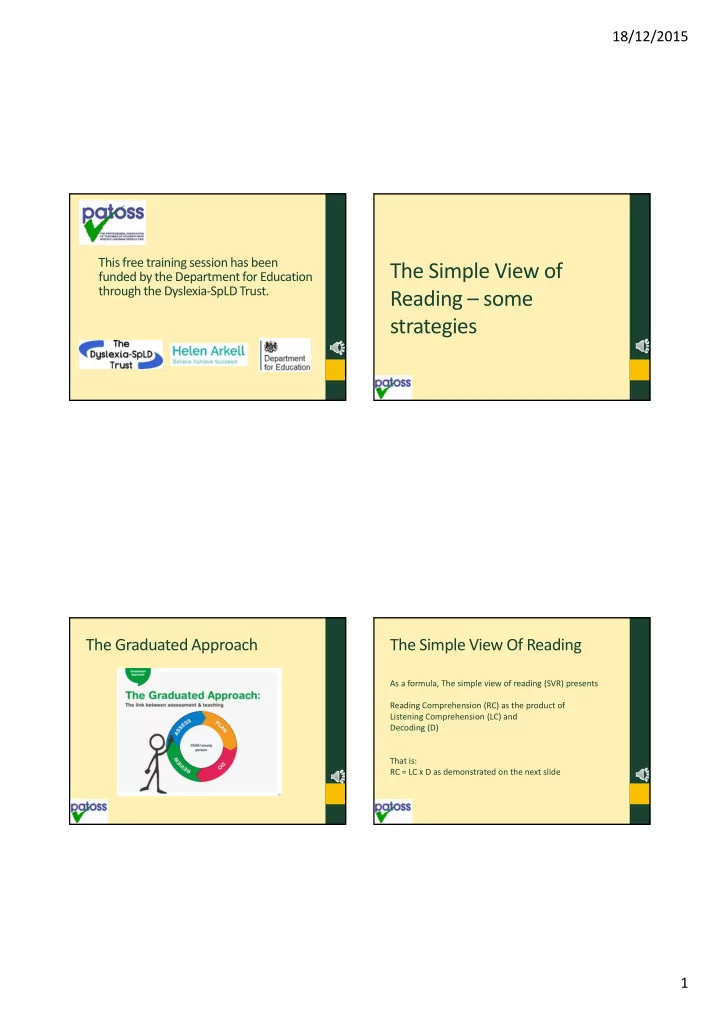

18/12/2015 This free training session has been The Simple View of funded by the Department for Education through the Dyslexia ‐ SpLD Trust. Reading – some strategies The Graduated Approach The Simple View Of Reading As a formula, The simple view of reading (SVR) presents Reading Comprehension (RC) as the product of Listening Comprehension (LC) and Decoding (D) That is: RC = LC x D as demonstrated on the next slide 1
18/12/2015 The Simple View Of Reading Simple View Of Reading explained Proposes that there are two sets of abilities that contribute to reading: • Language comprehension = the ability to understand language we hear and language we read • Word recognition abilities = the ability to read and understand the words on the page • These are seen as continuous dimensions: people can vary independently on each. It is a fully interactive model the separation of these two • dimensions are in the teacher’s mind, for pedagogic purposes, not NOT in the student’s mind. Classroom Teaching strategies – what could Teaching Strategies Adjustments to classroom be done? environment – What Adjustments could be provided? Highlighting and discussing new vocabulary. Talking Worksheets. Using visual cues to support Visual symbols to support poor reading. reading ability – e.g. labels on resources. Teaching how to highlight key words. Voice Recorders. Simple dictionary/thesaurus. Checking understanding Providing subject glossaries in Using ICT hard copy and electronic format. Teaching metacognitive Highlighter pen for strategies: ‘Giving learners keywords/concepts. Whiteboard control of their own learning’. adjustments. 2
18/12/2015 Teaching strategies – what Good Word could be done? Comprehension Recognition – Set the scene for reading Poor Comprehension Use visualization skills Give strategies for extracting meaning Introduce vocabulary before reading tasks Use components of words to extract meaning ‐ Morphology Poor Word Recognition – Complexity grid C o m p l e x i t y Good Comprehension Is Did Can Would Will Might C Teaching strategies – what o could be done? Who m Talk about the text and ask p What the student what they l e think will happen, looking Where x at pictures or graphs. i When t Split keywords into y syllables and read Why together and discuss how it looks and what it means. How 3
18/12/2015 Good Word Recognition – Good Comprehension Teaching strategies – what could be done? Encourage students to gain Simple View of Reading control of their learning (metacognition) I have read….. Activity Therefore I know…… Looking at Case Studies So I think…. We learn to read so we can read to learn – and enjoy! More reading improves comprehension and learning. Our examples * Kelly: Conversation about Ben : Further assessment * skills, motivation and of working memory skills strategies – any perceived and possible dyslexic difficulties. profile. Jack : Language skills * assessment. Comprehension skills. Active Reading. * Kerry: Language Skills assessment? Instructional level reading plus work on phonological skills. Working memory skills assessment? 4
18/12/2015 Next steps Some useful references • Consider your learners and decide where • Interventions for Literacy: www.interventions for literacy.org.uk you would place each one. • The Dyslexia ‐ SpLD Trust website: www.thedyslexia ‐ spldtrust.org.uk • Rose, J (2009) Identifying and Teaching Children and • Reflect on the resources and methodology Young People with Dyslexia and Literacy Difficulties for supporting reading that best suits each downloadable from the DST website. quartile for your learners • Rose, J (2006) Independent Review of the Teaching of Early Reading: Final Report (downloadable from http://dera.ioe.ac.uk/5551/2/report.pdf • Wolf, M (2008) Proust and the Squid, Icon Books Thank you for participating Training provided in partnership with Helen Arkell Patoss Springboard for Children under the Dyslexia ‐ SpLD Trust With contributions from Patoss trainers, Suffolk County Council team and graphics from Angella Vaughan at South Worcestershire College 5
Recommend
More recommend